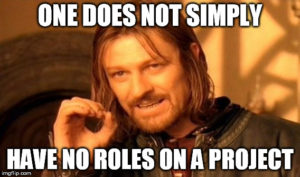This is the first part of the new series on Huddle; Busting a Testing Myth. Each month we invite members of the community to share some aspect of the software testing industry that they think is generally accepted but might not necessarily be true.
The first post looks at roles in Agile and the idea of merge Roles in Agile.
If you have a testing myth that you think should be debunked you can share your own argument here.
With current Agile approach there’s a little bit of anxiety, especially among Software Testers, about “Roles merge” idea. Let me comfort you – roles do merge, but they do not disappear. Lets have a look at this in a little bit more detail. First, let’s discuss why roles do and should merge in Agile projects, then why they will never disappear.

Why Merge Roles in Agile
An Agile team is typically is a cross-functional team having shared goals (well, at least in theory). For instance, this goal may be to paint a room, prepare a party, write the best software or anything else. This means that there will be situations where one needs to step in and help others do their job.
A near perfect example of this was a truly agile and cross-functional team of criminals trying to rob a Casino in a movie “Ocean’s eleven“. This team consists of criminals with various primary skills, but when necessary, one is abandoning his primary skill and doing something he is not specialized in.
Thus the nature of a project in a complex and ever-changing environment; you will have to adjust your plan to conform to the real world. In software developer terms, when QA specialist struggles with testing some functionality, the development specialist may help or do some other test related work. Similarly, if all developers got the flu (it could happen!), somebody will have to proceed with implementing functionality. There’s no time to wait, value should be delivered no matter what and team should do it’s best to help this happen.
Naturally, team members are widening their own skills in adjacent areas becoming more general specialist, merging roles. This also is a great tool of decreasing the likelihood of the “Bus factor” phenomenon.
Why Roles don’t Disappear
Still, one can’t be very good at everything. It is hardly possible to be great front-end and back-end developer, or be both good at writing and testing software. Each skill requires time to grow. Skill exercised most will always be better developed then others.
Look at “Ocean’s eleven” again. Each of team members is particularly good at something. In a similar fashion. you team will require somebody particularly good in front-end, database development and testing. Naturally, those who has particularly good skills in something will spend more time on exercising they skill, both because it lets us get value faster and because they just like doing their kind of things more. Roles will never disappear entirely, just be less prominent.
I hope that you find this post useful and please feel free to share your ideas in comments.
About The Author
Alex is a software tester based in Belarus. He has been working in IT since 2006 where his experience is based around testing, automated testing and test automation. Alex has experience with Java, .net framework, Python and Kotlin. Alex’s ultimate goal is to achieve effective and feasible quality control approach for a project. You can read more of Alex thoughts on his blog here.
